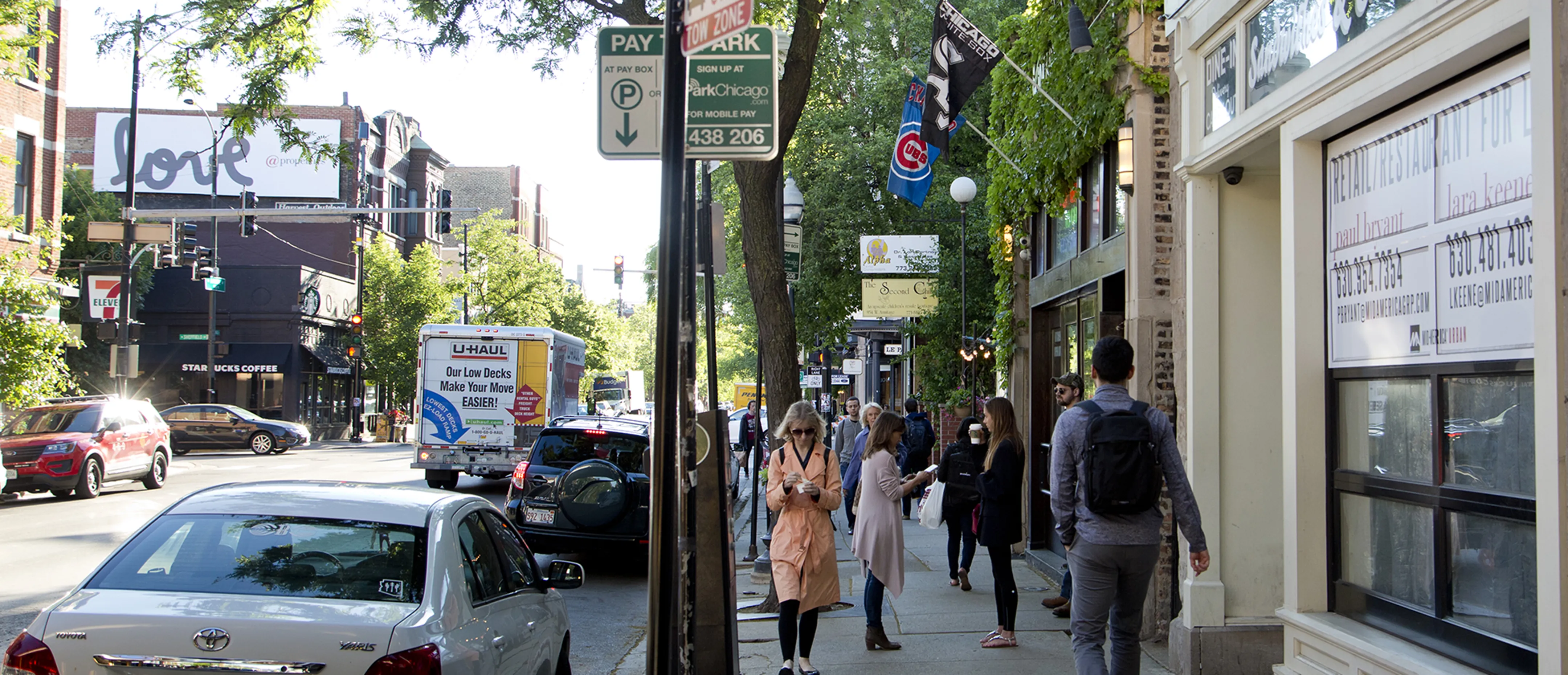History in Lincoln Park
Movies
High Fidelity - Lounge Ax
Rob (John Cusak) sees see Marie De Salle at Lounge Ax, which is now Soiree Bar Bistro at 2438 North Lincoln Avenue.
The Blues Brothers - Civil Defense Siren
Jake (John Belushi), Elwood (Dan Aykroyd) and the band steal the civil defense siren at the Oscar F. Mayer Elementary School playground at 2250 North Clifton Avenue.
History in Lincoln Park
Vintage Restaurants
Cafe Brauer
Cafe Brauer at 2021 North Stockton Drive(also known as the South Pond Refectory) has been serving parkgoing Chicagoans for more than 50 years, though not consecutively. Perched along the edge of the South Pond in Lincoln Park, on the grounds of the Lincoln Park Zoo, the cafe originally opened in 1908 in a classic, elegant, highly-acclaimed, prairie-style building designed by Dwight H. Perkins. The restaurant, originally commissioned by the Brauer family, was one of the most popular eateries in Chicago in the early twentieth century. It gradually fell into decline following the repeal of Prohibition, in part because state law forbid the service of alcoholic beverages in public parks. Cafe Brauer ultimately closed in 1941 and remained dormant for nearly 50 years while the building served as a storage facility for the zoo. Following years of community efforts to revive it, a
Cafe Brauer at 2021 North Stockton Drive(also known as the South Pond Refectory) has been serving parkgoing Chicagoans for more than 50 years, though not consecutively. Perched along the edge of the South Pond in Lincoln Park, on the grounds of the Lincoln Park Zoo, the cafe originally opened in 1908 in a classic, elegant, highly-acclaimed, prairie-style building designed by Dwight H. Perkins. The restaurant, originally commissioned by the Brauer family, was one of the most popular eateries in Chicago in the early twentieth century. It gradually fell into decline following the repeal of Prohibition, in part because state law forbid the service of alcoholic beverages in public parks. Cafe Brauer ultimately closed in 1941 and remained dormant for nearly 50 years while the building served as a storage facility for the zoo. Following years of community efforts to revive it, a
Cafe Brauer at 2021 North Stockton Drive(also known as the South Pond Refectory) has been serving parkgoing Chicagoans for more than 50 years, though not consecutively. Perched along the edge of the South Pond in Lincoln Park, on the grounds of the Lincoln Park Zoo, the cafe originally opened in 1908 in a classic, elegant, highly-acclaimed, prairie-style building designed by Dwight H. Perkins. The restaurant, originally commissioned by the Brauer family, was one of the most popular eateries in Chicago in the early twentieth century. It gradually fell into decline following the repeal of Prohibition, in part because state law forbid the service of alcoholic beverages in public parks. Cafe Brauer ultimately closed in 1941 and remained dormant for nearly 50 years while the building served as a storage facility for the zoo. Following years of community efforts to revive it, a
Frances' Deli
As the deco sign says outside the restaurant, Frances' Deli has been serving meals to hungry diners since 1938. Now located a few blocks north of its original hole-in-the-wall location at 2552 North Clark Street, Frances fancies herself a delicatessen, but the menu veers deeply into modern American fare. Yes, there are heaping, traditional deli-type sandwiches and such ethnic delights as fried matzoh and matzoh-ball soup, but a New York style delicatessen atmosphere is not really the schtick here.
John Barleycorn's
John Barleycorn's traces its ancestry to a saloon that opened in the brick building at this location in 1890. The original proprietor apparently moonlighted as a police officer at night. During Prohibition, the saloon was a notorious speakeasy. The front was completely boarded up to lend the appearance that it closed down, but both the moonshine and the clientele entered through a Chinese laundry in the back of the store. A hidden elevator in the basement of the laundry offered secret access. It is said that John Dillinger (who met his fate outside the Biograph Theater down the street) often dropped in and bought the house a round. In 1965, the bar was purchased and named "John Barleycorn's" by a Dutchman named Eric Van Gelder, who had a passion for handmade ships, paintings, and other artifacts which he brought back or collected from places all around the world and which remain on display today.
Salt & Pepper Diner
The Salt & Pepper diner has been serving inexpensive, not-overly-greasy, greasy spoon breakfasts and lunches to locals since 1965.
History in Lincoln Park
Residents
Albert and Lucy Parsons
Albert and Lucy Parsons organized the Eight-Hour Day Movement in May 1886. Albert spoke at the Haymarket Rally and was one of eight people who was later blamed for the bombing. He was found guilty and hanged on November 11, 1887. Lucy used her public speaking skills to promote labor, women's, and civil rights. The two were living at 1908 North Mohawk Street when their son was born on September 14, 1879.
Laszlo Moholy-Nagy
In 1937, artist and educator Laszlo Moholy-Nagy came to Chicago and founded the New Bauhaus Art and Design School, which closed due to financial reasons just a year later. Moholy-Nagy then opened his "Institute of Design," which is now part of the Illinois Institute of Technology's Institute of Design. He resided at 2622 North Lakeview Avenue.
Mother Frances Xavier Cabrini
Saint Frances Xavier Cabrini was the first American citizen to be canonized by the Roman Catholic Church. In Chicago, Cabrini opened the first Italian immigrant school (the Assumption School) and helped establish Columbus Hospital. She is the "Cabrini" in the Cabrini-Green public housing development, which began as Frances Cabrini Homes in 1942. Cabrini died in a small room in the original Columbus Hospital Building at 2520 North Lakeview Avenue.

